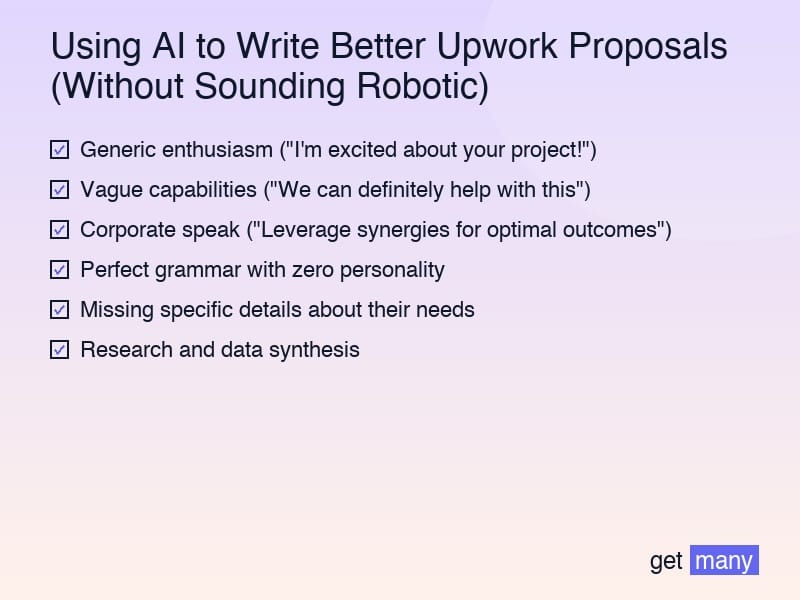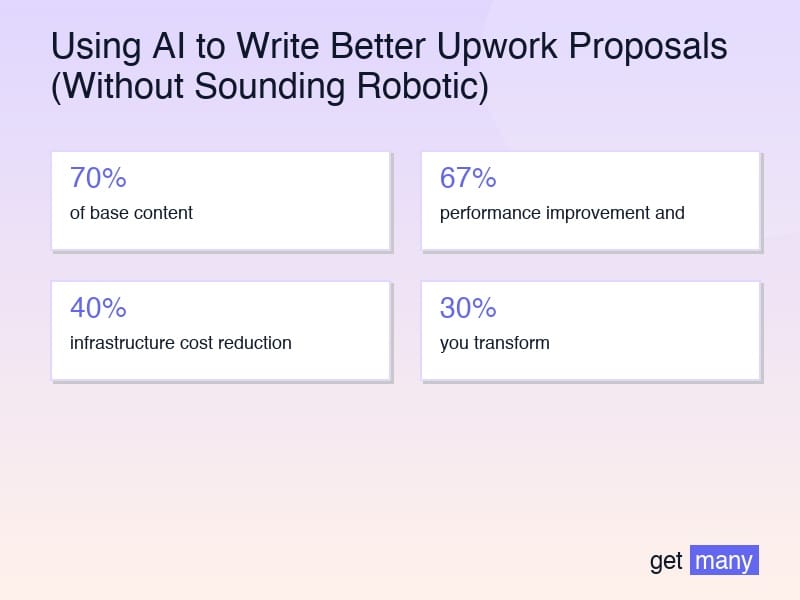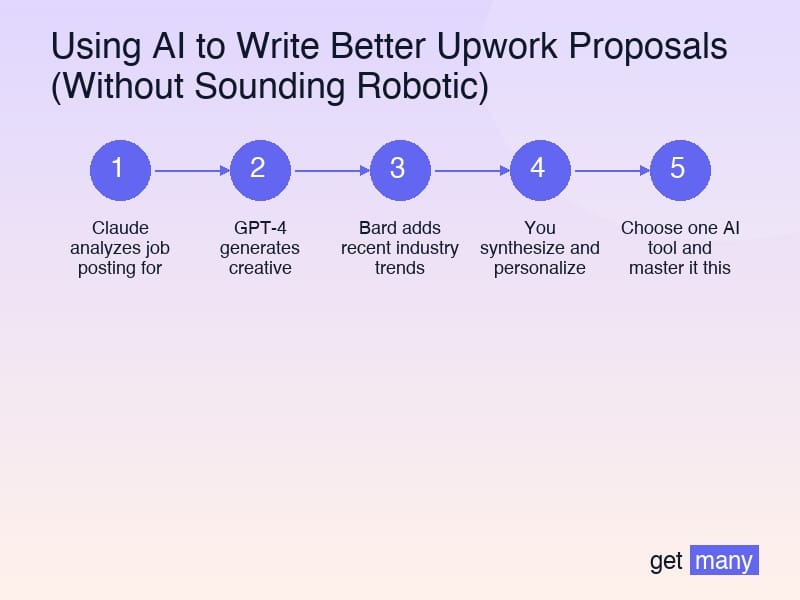4 August, 2025

Category
upwork-agencies
Author
Kyrylo Kozak
Using AI to Write Better Upwork Proposals (Without Sounding Robotic)
Last month, I watched two agencies with identical services compete for the same projects. Agency A wrote every proposal manually, sending 5 daily. Agency B used AI intelligently, sending 25 daily. The twist? Agency B's proposals felt more personal and converted at 3x the rate. The difference wasn't the AI - it was how they used it.
The rise of AI has created a new divide on Upwork: agencies who fear it, agencies who abuse it, and agencies who master it. Most fall into the first two categories, either avoiding AI entirely or producing robotic garbage that clients can smell from a mile away.
This guide reveals how to join the elite third category - agencies that leverage AI to amplify their humanity, not replace it. Learn to write proposals that are simultaneously scalable and deeply personal, efficient and emotionally resonant.
The AI Paradox in Proposal Writing

Why Most AI Proposals Fail
The Telltale Signs Clients Spot:
- Generic enthusiasm ("I'm excited about your project!")
- Vague capabilities ("We can definitely help with this")
- Corporate speak ("Leverage synergies for optimal outcomes")
- Perfect grammar with zero personality
- Missing specific details about their needs
The Uncanny Valley Effect: When proposals are almost human but not quite, they trigger subconscious rejection. Clients sense something's "off" even if they can't articulate what.
Why Smart AI Usage Wins
AI Excels At:
- Research and data synthesis
- Structure and formatting
- Grammar and clarity
- Idea generation
- Pattern recognition
Humans Excel At:
- Emotional connection
- Creative insights
- Industry nuance
- Personal experience
- Authentic voice
The Sweet Spot: AI handles the heavy lifting while humans add the soul.
The Human-AI Collaboration Framework

Level 1: AI as Research Assistant
What AI Does:
- Analyzes job postings for key requirements
- Researches company background
- Identifies industry trends
- Suggests relevant case studies
- Extracts technical specifications
What You Do:
- Verify AI findings
- Add personal insights
- Connect dots creatively
- Select most relevant points
- Inject authentic voice
Example Workflow: ``` AI Input: "Analyze this job posting and company" AI Output: Key points, company info, requirements Human: Select relevant insights, add personal experience Result: Deeply researched, personally crafted proposal ```
Level 2: AI as Structure Builder
What AI Does:
- Creates proposal outline
- Suggests section flow
- Organizes key points
- Formats for readability
- Ensures completeness
What You Do:
- Customize structure
- Reorder for impact
- Add transitions
- Inject personality
- Polish flow
AI Prompt Example: "Create a proposal structure for [project type] that includes problem acknowledgment, solution approach, relevant experience, and strong CTA. Format for easy scanning."
Level 3: AI as Content Generator
What AI Does:
- Drafts initial paragraphs
- Expands on bullet points
- Creates multiple variations
- Suggests improvements
- Maintains consistency
What You Do:
- Rewrite in your voice
- Add specific details
- Include real examples
- Personalize heavily
- Ensure authenticity
The 70/30 Rule: AI generates 70% of base content, you transform 30% into gold.
Level 4: AI as Optimization Engine
What AI Does:
- A/B tests different approaches
- Analyzes winning patterns
- Suggests improvements
- Tracks performance
- Identifies trends
What You Do:
- Set testing parameters
- Interpret results
- Apply human judgment
- Refine based on feedback
- Maintain quality standards
The Anti-Robotic AI Prompting Guide

Prompt Engineering for Humanity
Basic Prompt (Robotic Result): "Write a proposal for web development project"
Advanced Prompt (Human Result): "Write a conversational proposal for a SaaS startup needing React development. Voice: confident but not arrogant, specific but not jargony. Include: acknowledgment of their scaling challenges, our rapid deployment approach, and why startups choose us. Avoid: generic phrases, corporate speak, obvious AI patterns. Add: one unexpected insight about their industry."
The Personality Injection Framework
Voice Parameters to Specify:
- Tone (professional yet approachable)
- Energy level (calm confidence vs high enthusiasm)
- Technical depth (adjust per client sophistication)
- Humor level (when appropriate)
- Cultural awareness (industry-specific communication)
Example Voice Prompt: "Write like a seasoned developer who's genuinely interested in solving problems, not selling services. Use 'we/us' not 'I', include technical details without being condescending, and add subtle indicators of expertise without bragging."
The Specificity Engine
Generic AI Output: "We have extensive experience in web development"
Specific AI Output (with proper prompting): "We've migrated 12 SaaS platforms from monoliths to microservices, averaging 67% performance improvement and 40% infrastructure cost reduction"
Specificity Prompt Template: "Include specific metrics, numbers, and examples. Instead of 'extensive experience,' say 'X years/projects.' Instead of 'improved performance,' say 'reduced load time from X to Y seconds.' Make every claim quantifiable."
AI Tools and Workflows
The Optimal Tool Stack
For Research:
- Perplexity AI for company research
- ChatGPT for requirement analysis
- Claude for nuanced understanding
- Bard for real-time information
For Writing:
- GPT-4 for initial drafts
- Claude for refinement
- Jasper for variations
- Copy.ai for headlines
For Optimization:
- Getmany for Upwork-specific optimization
- Grammarly for polish
- Hemingway for clarity
- Custom GPTs for consistency
The Proposal Production Pipeline
Stage 1: Intelligence Gathering (2 minutes) ``` AI Task: Extract and analyze:
- Core requirements
- Budget indicators
- Timeline urgency
- Pain points
- Decision criteria
Human Task: Verify accuracy, add insights ```
Stage 2: Strategy Formation (1 minute) ``` AI Task: Suggest:
- Best approach angle
- Key differentiators
- Relevant proof points
- Optimal structure
Human Task: Select and customize strategy ```
Stage 3: Content Creation (3 minutes) ``` AI Task: Generate:
- Opening hook options
- Solution paragraphs
- Proof sections
- Call to action
Human Task: Rewrite, personalize, authenticate ```
Stage 4: Polish and Perfect (1 minute) ``` AI Task: Check:
- Grammar and clarity
- Formatting consistency
- Keyword optimization
- Reading flow
Human Task: Final personality injection ```
Total Time: 7 minutes per proposal
The Quality Assurance System
AI Detection Check:
- Run through AI detection tools
- Flag obvious AI patterns
- Identify robotic phrases
- Score authenticity
Human Review Points:
- Does it sound like a real person?
- Are claims specific and verifiable?
- Is industry knowledge accurate?
- Would I respond to this?
Red Flags to Fix:
- "I'm excited about your project"
- "Leveraging cutting-edge solutions"
- "Seamless integration"
- "Best-in-class delivery"
- Perfect paragraph structure
Advanced AI Techniques
The Multi-Model Approach
Use Different AIs for Different Strengths:
- GPT-4: Creative problem-solving
- Claude: Nuanced understanding
- Bard: Current information
- Specialized tools: Industry-specific knowledge
Example Workflow:
- Claude analyzes job posting for nuance
- GPT-4 generates creative solution approach
- Bard adds recent industry trends
- You synthesize and personalize
The Iterative Refinement Method
Round 1: AI generates base proposal Round 2: You identify weak sections Round 3: AI rewrites specific parts with new prompts Round 4: You add personal touches Round 5: AI polishes without losing voice
Refinement Prompts:
- "Make this paragraph more conversational"
- "Add specific metrics to these claims"
- "Reduce corporate speak by 90%"
- "Include a surprising insight here"
- "Make the opening more attention-grabbing"
The Personality Library System
Create AI Personas for Different Scenarios:
The Technical Expert: "You are a senior developer who explains complex topics simply. You're helpful but not condescending, specific but not overwhelming. Include code references when relevant."
The Strategic Consultant: "You are a business strategist who sees the big picture. Focus on ROI and business outcomes. Use MBA-level language but keep it practical and actionable."
The Creative Innovator: "You are a creative director who brings fresh perspectives. Be enthusiastic but professional. Include unexpected angles and innovative solutions."
Maintaining Authenticity at Scale
The Human Touch Checklist
Every AI-assisted proposal must include:
- [ ] One personal observation
- [ ] One industry-specific insight
- [ ] One emotional connection point
- [ ] One unique perspective
- [ ] One authentic voice marker
The Authenticity Injection Points
Opening Line: Always write manually Client Pain Point: Add personal understanding Solution Approach: Include unique methodology Proof Points: Use real, specific examples Closing: Personal call to action
The Voice Consistency Framework
Document Your Voice:
- Key phrases you use
- Sentence structure patterns
- Technical terminology preferences
- Humor style (if any)
- Sign-off approach
Train AI on Your Voice: "Here are 5 examples of my writing. Analyze the voice, tone, and patterns. Apply these to future proposals while maintaining authenticity."
Ethical AI Usage
The Transparency Question
Best Practice: Focus on value, not tools
- Clients care about results, not your process
- AI is a tool like any other software
- The value is in strategy and execution
The Quality Commitment
Never Compromise:
- Accuracy of claims
- Relevance to client needs
- Authenticity of voice
- Value of insights
- Human connection
Measuring AI Impact
Key Metrics to Track
Efficiency Metrics:
- Proposals per hour
- Time per proposal
- Research time saved
- Revision cycles reduced
Quality Metrics:
- Response rates
- AI detection scores
- Client feedback
- Win rates
ROI Calculation: ``` AI ROI = (Additional Revenue from Volume × Win Rate) - AI Tool Costs ------------------------------------------------ Time Saved × Hourly Rate ```
Your AI Implementation Roadmap
Week 1: Foundation
- Select AI tools
- Create voice documentation
- Build initial prompts
- Test on 5 proposals
Week 2: Refinement
- Analyze results
- Refine prompts
- Build persona library
- Scale to 20 proposals
Week 3: Optimization
- A/B test approaches
- Create workflow documentation
- Train team members
- Track all metrics
Week 4: Scale
- Full implementation
- Continuous refinement
- Build prompt library
- Share best practices
The Future of AI-Augmented Proposals
What's Coming:
- Real-time personalization
- Predictive response rates
- Automated A/B testing
- Voice cloning for consistency
- Integrated research pipelines
What Won't Change:
- Need for human strategy
- Importance of authenticity
- Value of real experience
- Power of genuine connection
- Premium on creativity
Your AI Advantage Action Plan
The agencies winning on Upwork aren't avoiding AI - they're mastering it. The key is using AI to amplify your humanity, not replace it.
Your immediate steps:
- Choose one AI tool and master it this week
- Create your voice documentation for consistency
- Write 5 proposals using the Human-AI Framework
- Track results compared to manual proposals
- Refine and scale based on data
Remember: AI is your proposal writing superpower, but with great power comes great responsibility. Use it wisely, and watch your agency transform.
Ready to join the AI-augmented elite? The tools are available. The framework is proven. The competitive advantage is yours to claim.
How will you blend AI efficiency with human authenticity?





